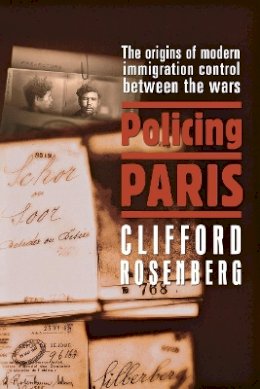
Policing Paris: The Origins of Modern Immigration Control between the Wars
Clifford D. Rosenberg
The surveillance of immigrants and potential terrorists preoccupies leaders throughout the industrialized world. Yet these concerns are hardly new. Policing Paris examines a critical moment in the history of immigration control and political surveillance. Drawing on massive police archives and other materials, Clifford Rosenberg shows how in the years after the Great War the French police, terrified by the Bolshevik Revolution and the specter of immigrant criminality, became the first major force anywhere systematically to enforce distinctions of citizenship and national origins.
As the French capital emerged as a haven for refugees, dissidents, and workers from throughout Europe and across the Mediterranean in the 1920s, police officers raided immigrant neighborhoods to scare illegal aliens into registering with authorities and arrested those whose papers were not in order. The police began to concentrate on colonial workers from North Africa, tracking these workers with a special police brigade and segregating them in their own hospital when they fell ill. Transformed by their enforcement, legal categories that had existed for hundreds of years began to matter as never before. They determined whether or not families could remain together and whether people could keep their jobs or were forced to flee.
During World War II, identity controls marked out entire populations for physical destruction. The treatment of foreigners during the Third Republic, Rosenberg contends, shaped the subsequent treatment of Jews by Vichy. At the same time, however, he argues that the new methods of identification pioneered between the wars are more directly relevant to the present day. They created forms of inclusion and inequality that remain pervasive, as industrial welfare states around the world find themselves compelled to provide benefits to their own citizens and recruit foreign nationals to satisfy their labor needs.
Product Details
About Clifford D. Rosenberg
Reviews for Policing Paris: The Origins of Modern Immigration Control between the Wars
Michael Miller, University of Miami "Drawing on important files in Parisian police records, Clifford Rosenberg argues that the elaboration of record keeping about and control of immigrants in Paris in the interwar years was the first act in establishing the French welfare state. Policing Paris integrates current discussions of the bad treatment of immigrants from the colonial empire into a larger tradition of the reception of European foreign workers in France. Rosenberg gives us a nuanced and sophisticated treatment of the how and when of French racism against people from the colonies."
Herman Lebovics, State University of New York at Stony Brook, author of Mona Lisa's Escort: André Malraux and the Reinvention of French Culture "Policing Paris displays an original and innovative way of approching immigration policy and French colonial power and practice through local history. This important book was very well researched." "This is political, social, and institutional history at its very best. Clifford Rosenberg transforms what is essentially a French story into a book that engages citizenship, the welfare state, immigration, and nationality in a global context. How the category of immigrant came to be defined, the legal rights (and lack thereof) that have attached to the particular status of foreigner, and the reasons for which immigrants have assimilated or not into their new homes are once again immediately relevant in Europe and the United States."
Alice L. Conklin, The Ohio State University
